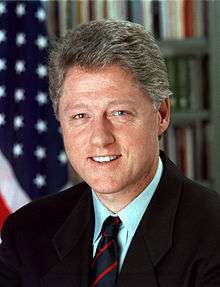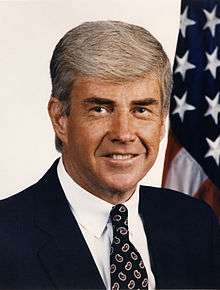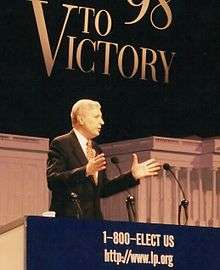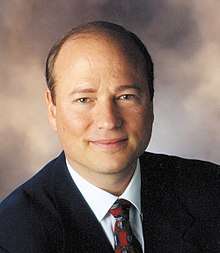United States presidential debates, 1996
The United States presidential election debates were held during the 1996 presidential election. Three debates were held between Republican candidate, Senate Majority Leader Bob Dole and Democratic incumbent President Bill Clinton, the major candidates. One debate was held with their vice presidential running mates, Jack Kemp and Al Gore. All three debates were sponsored by the non-profit Commission on Presidential Debates (CPD), which has organized presidential debates since its establishment in 1987.
The vice presidential debate was held on October 9 at the Mahaffey Theater. The presidential debates were held on October 6 at The Bushnell and October 16 at University of San Diego, ahead of the November 7 Election Day. Jim Lehrer moderated each of the presidential debates. In each of the first two debates, the candidates received questioned in turn with two minutes to answer and a 60-second rebuttal. The third and final debate featured a town hall meeting format.
Participant selection
In 1996, the following 6 candidates achieved ballot access in enough states to mathematically win the election via the Electoral College:
| Presidential Candidate | Party | Ballot access |
|---|---|---|
| Bob Dole | Republican | 50+DC |
| Bill Clinton | Democratic | 50+DC |
| Ross Perot | Reform | 50+DC |
| Harry Browne | Libertarian | 50+DC |
| John Hagelin | Natural Law | 43 |
| Howard Phillips | Constitution | 41 |
Unlike in 1992, Ross Perot would be excluded from the debates in the 1996 campaign, the Paul Kirk, co-chairman of the Commission on Presidential Debates stated that "Our decision,was made on the basis that only President Clinton and Senator Dole have a realistic chance, as set forth in our criteria, to be elected the next president of the United States."[1]
Only Senate Majority Leader Bob Dole and President Bill Clinton met the CPD selection criteria for any of the presidential debates. As a result, only Jack Kemp and Al Gore met the criteria for the vice presidential debate.
Schedule
Two presidential debates were scheduled by the Commission on Presidential Debates:
- October 6 at The Bushnell, with questions from moderator Jim Lehrer of PBS;
- October 16 at University of San Diego, with questions from moderator Jim Lehrer of PBS;
One vice-presidential debate was held:
- October 9 at Mahaffey Theater, moderated by Jim Lehrer of PBS.
First presidential debate (The Bushnell Center for the Performing Arts)
The Debate was held in the Bushnell Center for the Performing Arts in Hartford, Connecticut.

Arkansas
Jim Lehrer of PBS' The NewsHour posed the following questions for each candidate:
Questions for President Clinton
- Mr. President, first question. There is a major difference in your view of the role of the Federal government and that of Senator Dole. How would you define the difference?
- Mr. President, Senator Dole has come pretty close in the last few days to accusing you of lying about his position on Medicare reform. Have you done so?
- Mr. President, the Senator mentioned trial lawyers and campaign, that means campaign financing. How do you personally avoid being unduly influenced by people who give you money or give you services in your campaigns?
- Mr. President, the Senator mentioned drugs. He suggested that you are—you bear some responsibility for the rise in drug use of teenagers in the United States. Is he right?
- Mr. President, Senator Dole said the other day that you practiced a photo-op foreign policy that has lessened the credibility of the United States throughout the world. Is he wrong about that?
- Mr. President, what is your attitude toward Cuba and how Cuba should be treated?
- Back to foreign affairs for a moment, Mr. President. Are you satisfied with the way you handled this last Iraq crisis and the end result?
- Mr. President, in your acceptance speech in Chicago, you said the real choice in this race is, quote, whether we build a bridge to the future or a bridge to the past; about whether we believe our best days are still out there or our best days are behind us; about whether we want a country of people all working together or one where you're on your own, end quote. Are you saying that you believe Senator Dole is a man of the past and if elected president he would lead the country backward?
- Mr. President, what is wrong with the school choice proposal?
- Mr. President, if you're not a liberal, describe your political philosophy.
- Mr. President, what do you say to Senator Dole's point that this election is about keeping one's word?
Questions for Senate Majority Leader Dole
- Senator Dole, the President said in his opening statement we are better off today than we were four years ago. Do you agree?
- Senator Dole, speaking of your tax plan, do you still think that's a good idea, the 15 percent across the board tax cut?
- Well, Senator Dole, let me ask you the same question I asked the President: How do you avoid being influenced by people who contribute money and services to your campaigns?
- Senator Dole, on the government, continuing to talk about the government's role. If elected President, would you seek to repeal the Brady Bill and the ban on assault weapons?
- Senator Dole, if elected president, what criteria would you use to decide when to send U.S. troops into harm's way.
- Senator Dole, you mentioned health reform several times. What do you think should be done about the healthcare system?
- Senator Dole, on your photo-op foreign policy charge against the President
- Senator Dole, do you still favor eliminating the Department of Education.
- Senator Dole, at the Republican convention you said the following and I quote, it is demeaning to the nation that within the Clinton Administration a core of the elite who never grew up, never did anything real, never sacrificed, never suffered, and never learned should have the power to fund with your earnings their dubious and self-serving schemes, end quote. Whom precisely and what precisely did you have in mind?
- Senator Dole, we've talked mostly now about differences between the two of you that relate to policy issues and that sort of thing. Are there also significant differences in the more personal area that are relevant to this election?
- Senator Dole, if you could single out one thing that you would like for the voters to have in their mind about President Clinton on a policy matter or a personal matter, what would it be? Something to know about him, understand it and appreciate it.
Transcript
- Debate transcript from the Commission on Presidential Debates website.
Viewership
An estimated 46.1 million viewers tuned into the debates.
Vice presidential debate (Mahaffey Theater)
The Debate was held in the Mahaffey Theater in St. Petersburg, Florida.

California
Jim Lehrer of PBS' The NewsHour posed the following questions for each candidate:
Questions for Vice President Gore
- Mr. Vice President, what do you see as the political philosophy differences in a general way between you and President Clinton on the one hand, Mr. Kemp and Senator Dole on the other?
- Mr. Vice President, should federal government Affirmative Action programs be continued?
- Mr. Vice President, if re-elected, what would, what could we look forward to in the way of an inner city policy from a Clinton/Gore second term?
- Mr. Vice President, what about Mr. Kemp's point that he's made a couple of times that what we need is to throw away the current—the present tax code and write a whole new tax system. Do you agree with that?
- Mr. Vice President, is the war in Bosnia really over, or is it going to break out again once the U.S. and the NATO troops leave?
- Mr. Vice President, Mexico, we caused the problem, then had to go in and bail them out?
- Mr. Vice President, some Democrats have charged that the environment would be in jeopardy if Mr. Kemp and Senator Dole are elected. Do you share that fear?
- Mr. Vice President, does the government of the—of the United States as now operated by the Clinton Administration operate on a reign of terror, through a reign of terror?
- Mr Vice President, Senator Dole raised the same question to President Clinton the other night about keeping promises made. What is your reaction to that? What is your response to that charge against you and the President.
- Mr. Vice President, do you agree with that thesis that in order to solve the problem of civility, the problems of the American soul, you have to—it's an economic problem more than it is something else?
Questions for Former Secretary of Housing and Urban Development Kemp
- Mr. Kemp, back to the philosophy question. Do you think there's a basic philosophy difference between these two tickets, or is it about specifics, which both of you have talked about?
- Mr. Kemp, what is your position(on affirmative action)?
- Mr. Kemp, you said recently that one of the problems related to this was that all the capital was in the hands of the white people. What did you mean by that?
- Mr. Kemp, is it really possible to balance the budget without reforming drastically the entitlements programs, including Social Security and Medicare?
- Mr. Kemp, what, if anything, would a Dole/Kemp administration do to change the current legal status of abortion in this country?
- Mr. Kemp, Senator Dole has criticized the President on Haiti, that he handled that wrong. What did he do wrong?
- Mr. Kemp, Senator Dole the other night criticized President Clinton for cutting defense spending and, thus, cutting jobs in California. Is that how defense spending should be seen, as a jobs program as well?
- Mr. Kemp, you mentioned it already before and you said on "Meet the Press" Sunday that the federal government engages in "regulation reign of terror." What exactly do you mean?
- What measurement do you use, Mr. Kemp, in saying the economy is not growing the way it should be?
- Mr. Kemp, uh some are saying these days that something's gone terribly wrong with the American soul, that we've become too mean, too selfish, too uncaring and the spitting incident, how it was handled, the baseball players used as a recent example. What do you think about that?
- Mr. Kemp, speaking of the family, where do you come down on it? Do you believe it should be repealed? The Family Leave Act?
Transcript
- Debate transcript from the Commission on Presidential Debates website.
Viewership
An estimated 26.6 million viewers tuned into the debate.
Second presidential debate (University of San Diego)
The debate was held at the Shiley Theater on the campus of University of San Diego in San Diego, California
Jim Lehrer of PBS' The NewsHour moderated the town hall style debate featuring the following questions asked by members of the audience:
Questions for President Clinton
- I would like to know if you would please explain your plans for—in a substantive fashion for addressing the problems with the health care system in our country.
- Yassir Arafat said in Palestine that he thinks the key to success in the Middle East is the commitment of Americans. Would you as President send American troops to Israel or the West Bank as peacekeepers?
- Assuming you agree that our entitlement programs are on an unsustainable course, what specific reforms do you propose?
- Does your party have any future plans to reduce the capital gains tax, especially for retired Americans?
- Do you feel that America has grown enough and has educated itself enough to totally cut out Affirmative Action?
- Mr. President, could you outline any plans you have to expand the Family Leave Act?
- Can you please explain your policy on the Employment Nondiscrimination Act that would have prohibited discrimination, would have prohibited people from being fired from their jobs simply for being gay or lesbian.
- 63 percent of the American people are not participating that are eligible to vote, not even participating in the process. Several parties can't even get in the debate; the Green Party, the Reform Party, the Natural Law Party, all of these people are basically opted out of what we're still participating in. If we in fact are going to bring the country back together and be all faces around the table, the new American family, what do you see as something the president can do to begin that process to bring them back in?
- My question was how you plan to deal with the trade deficit with Japan.
- I heard Mr. Dole say several times "all of us together," and when he was asked if he would support equal rights and employment for gay and lesbian people, you said that you favored that, and he said that he did not believe in special rights. And I thought the question was equal rights for all people. And I don't understand why people are using the term "special rights" when the question is "equal rights." Could you help me in understanding that?
Questions for Senator Dole
- If you are president, how will you begin to practice what we are preaching to our children, the future of our nation?
- What is your position on closing the gap between military and civilian pay scales?
- You mentioned a statement—you said some time ago that you didn't think nicotine was addictive. Would you care to—are you still holding to that statement, or do you wish to recant or explain yourself?
- I would like to know what you are—what would be your first step in reforming welfare?
- All the controversy regarding your age. How do you feel you can respond to young voices of America today and tomorrow?
- Senator Dole, how do you reduce taxes and balance the budget?
- I see one of our biggest problems in the U.S. is it does not manufacture enough of our own products. How would you help this problem out?
- Being in health care—we have talked about a little bit about health care tonight, but mainly Medi-Cal and Medicare have been mentioned, but the private sector is a problem. Managed care is taking over, especially in California. And because of that, the quality of care is going downhill. There are many, many people who cannot get the tests that they need when they need them, and because of that, they are dying needlessly. There are many, many more lawsuits being presented against the managed care industry because of this. And I think it's a real problem that needs to be addressed. What would you do if you were president?
- Senator Dole, we talked about Social Security for us baby boomers. But shouldn't we be saving and investing for our own retirement as well? Are you planning any incentives to encourage us to take care of ourselves rather than to rely on the government and on Social Security when we retire?
- This great nation has been established by the founding fathers who possessed a very strong Christian belief in godly principles. If elected president of the United States, what could you do to return this nation to these basic principles? And also, do you feel that the president—the office of president has the responsibility to set the role example to inspire our young people?
Transcript
- Debate transcript from the Commission on Presidential Debates website.
Viewership
An estimated 36.3 million viewers tuned into the debate.
Third-party debates
- October 7, 1996 - C-SPAN sponsored a third party presidential debate moderated by Jennifer Laszlo. In attendance for this debate were Libertarian candidate Harry Browne, Constitution Party candidate Howard Phillips, and Natural Law Party candidate John Hagelin. Ross Perot declined the invitation to attend.
- October 23, 1996 - C-SPAN sponsored a third party presidential debate moderated by Bill Shen. In attendance for this debate were Libertarian candidate Harry Browne, Constitution Party candidate Howard Phillips, and Natural Law Party candidate John Hagelin. Ross Perot declined the invitation to attend.
References
- ↑ "Debate Commission Excludes Perot". cnn.com. Retrieved 1996-09-17. Check date values in:
|accessdate=(help)



